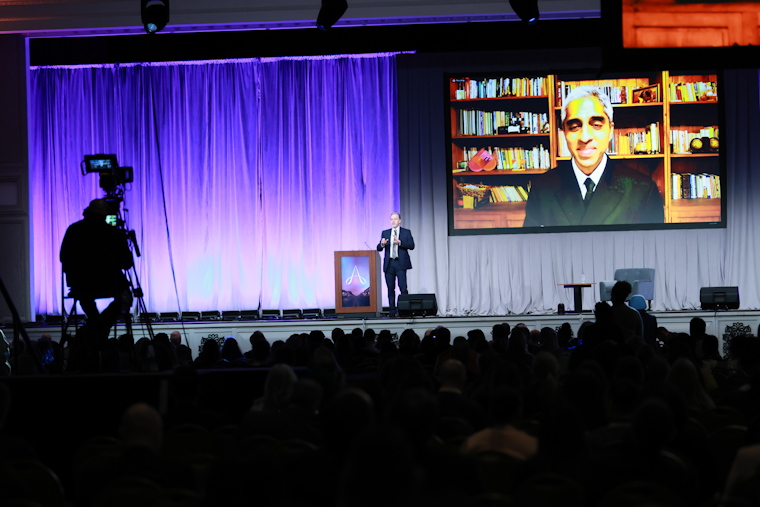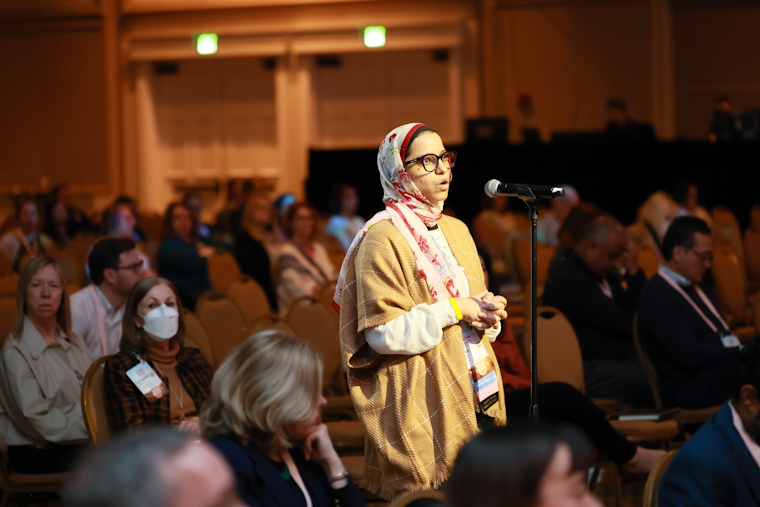#ACGME2023 Session Summary: SES002 – Featured Plenary: The NAM Plan for Health Workforce Well-Being
ACGME Chief of Staff and Chief Education Officer Timothy P. Brigham, MDiv, MS, PhD brought together two national leaders in medicine, Victor Dzau, MD, president of the National Academy of Medicine (NAM), and Vivek H. Murthy, MD, MBA, US Surgeon General, to discuss the work to develop the NAM National Plan for Health Workforce Well-Being.
“Knowing is not enough; we must apply. Willing is not enough; we must do.”
Dr. Dzau began the session by thanking ACGME President and Chief Executive Officer Thomas J. Nasca, MD, MACP for his leadership in the well-being movement. He went on to describe the need for a national effort to improve health workforce well-being, with a goal of embedding well-being as a long-term value across the nation. He discussed the health workforce crisis, noting that while burnout issues pre-date the COVID-19 pandemic, the pandemic intensified demands, risks, and stressful working conditions. The Action Collaborative for Well-Being, co-chaired by Drs. Dzau, Murthy, Nasca, and Darrell Kirch, MD of the Association of American Medical Colleges, was created to activate a movement to combat these challenges.
Dr. Dzau explained that the National Plan is intended to galvanize changemakers to spark action across the nation, with the hope that all stakeholders, even those outside of the health care field, are inspired to advocate for it. The goals of the Plan include raising visibility of clinician burnout, depression, moral injury, and suicide; improving understanding of well-being; advancing the development of evidence of the issue; and laying the foundation for cultural change to improve physician well-being. Dr. Dzau stated that this will be a grassroots movement.
Dr. Dzau then provided a detailed overview of the Plan, with priority areas:
- Positive work and learning environments and culture
- Measurement, assessment, strategies, and research
- Mental health and stigma
- Compliance, regulatory, and policy barriers for health workers’ daily work
- Effective technology tools
- Mitigating the effects of COVID-19 on the health workforce
- Recruitment of the next generation of health care workers
He ended with a quote from Goethe: “Knowing is not enough; we must apply. Willing is not enough; we must do,” and provided a website that lays out the National Plan in detail.
The session then transitioned to a conversation between Dr. Brigham and Dr. Murthy, who joined the session live through Zoom. In his introduction, Dr. Brigham noted that as the Marvin R. Dunn Keynote speaker at the 2020 ACGME Annual Educational Conference, Dr. Murthy introduced a word that is not often heard in medical education: love.
Dr. Murthy said it has always been clear to him that there is a challenge of well-being in medical education. He talked about attending a session of a course during his medical education called “The Healer’s Art,” taught by Dr. Rachel Remen. It showed him the value of medical students, residents, and attending physicians coming together to talk about the core values that brought them to the profession. It also highlighted that workplace burnout is something that can be addressed and prevented if the right culture is there. “This really is a fundamental issue of our time,” he said.
Dr. Murthy stated that a driving principle for him is acknowledging that the lives and well-being of clinicians and all health workers matter. Part of putting patient care and safety first is ensuring that the health workers who care for patients are also cared for themselves, and that they receive the care, respect, and support that every human being deserves.
Dr. Brigham noted that burnout is still on the rise, to which Dr. Murthy replied that the roots of burnout—a workplace phenomenon—are complex, and often compounded by mental health struggles that may be happening at the same time. Suicide rates often go down during a crisis, and then up afterward,” he said, adding that throughout the country, the sense of despair and depression is climbing.
What Is Driving that Deep Sense of Worry, Anxiety, and Despair?
Dr. Murthy noted many causes for this concerning trend. One, he said, is the speed of change. A second cause is the news. With coverage primarily of unpleasant, negative, and difficult topics, watching the news all the time can have a very negative effect, making it seem as though everything is broken. A third cause is what Dr. Murthy described as a lack of healthy dialogue. Lastly, he noted growing social isolation and disconnection, both physically and in other ways. This makes it harder to look to loved ones and community, and it enhances a sense of vulnerability. “Conversations have the power to heal,” he emphasized.
What Is the Solution?
Dr. Murthy said he believes strongly that the decline in health worker well-being is both a systems and a culture problem, and that solutions can start locally, offering three first steps:
- Ensure people have access to mental health services, and that the culture (led by institutional leaders) accepts and supports it.
- Create opportunities for peers to help and support one another.
- In the midst of crisis, the act of simply listening is often overlooked, and it is vital.
Dr. Murthy reminded the audience that the well-being movement began in graduate medical education. The National Plan is not for a few people, rather, it is a plan for us all. Being able to start the well-being conversation is what will drive culture change. Leaders need to create a space, he said, and beyond that, well-being must be tracked rigorously. He stressed that creating positive incentives, aligning what is measured and what is reimbursed for, in order to ensure health worker well-being is prioritized – all of this needs to be part of the conversation and planning.
When Dr. Brigham asked him where he finds hope, Dr. Murthy turned to the audience, thanking them for their work and dedication. Physicians still enjoy a great deal of trust from the public, he said, which creates an opportunity for the field of medicine to serve as the moral leaders he believes the country needs now.




